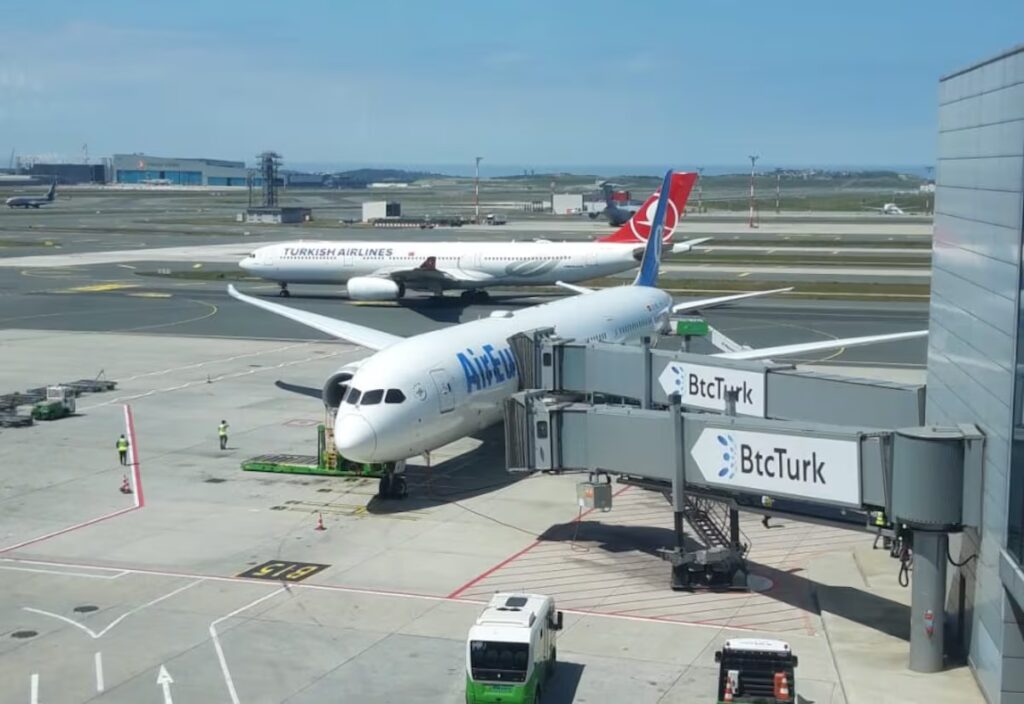
The near future of Air Europa involves close collaboration with its partner Turkish Airlines at an operational level, in maintenance and strengthening of the fleet, but the entry of the Turkish airline is awaiting regulatory authorizations and the parties have agreed on an alternative plan in the event of a refusal by the European Commission, although considering it a remote risk. Him The exchangeable loan of 300 million with which the Turkish company will take 26% of the capital will be transformed into ordinary credit, according to several sources consulted, if the operation goes badly in Brussels. The repayment period would reach three years,
Air Europa’s majority shareholder, Globalia, would have the ability to service that debt with dividends from the airline which is now headed by Richard Clark replacing Jesús Nuño de la Rosa. Profits are consolidating thanks to strong demand for flights and the cheap fuel environment.
Corporate operations in the airline sector have been under the sword of Damocles of the European Commission for years, awaiting the maintenance of acceptable levels of competition in air transport. Turkish Airlines’ investment is awaiting analysis regarding compliance with Regulation 2022/2560 of the European Parliament and of the Council on foreign subsidies distorting the domestic market. If the metamorphosis of credit into equity cannot occur, plan B comes into play.
The Turkish company would continue to support Air Europa through the aforementioned three-year ordinary loan which improves the previous financing conditions granted by SEPI. There were 475 million for which an interest of close to 9% was paid and whose maturity was within a year.
Air Europa, which had Javier Hidalgo, son of founder Juan José Hidalgo, leading the negotiations, has a vivid memory of how conditions imposed by the EU’s competition directorate-general derailed its purchase by IAG in August last year. It’s not the same case at all. In addition to being the grip of a minority package, and not the control that the holding company of Iberia, the routes where Turkish and Hidalgo airline overlap are few. Another question is whether or not the entry of the Turkish state-dominated company distorts the domestic market.
Faced with even the slightest doubt, Globalia decided to protect the operation with a clause which, in the worst case scenario, would place the Turkish airline as a creditor of Air Europa.
The approval of the operation by the European Commission is not expected in the short term. “The process of obtaining the necessary permits from the relevant regulatory authorities has been initiated, which is expected to be completed within approximately 6-12 months,” Turkish informs its shareholders. Only when you have the green light from the community will your credit be converted into shares.
New debt
Air Europa managed to pay off its debt in two stages. In May it returned 141 million to a syndicate of banks that had the backing of the ICO, and has now repaid the 475 million received in 2020 from the Solvency Support Fund for Strategic Companies (FASEE) overseen by SEPI. The airline used its own resources and the 300 million loaned by Turkish Airlines.
The latter figure, in exchange for a 26% stake in Air Europa – which could range between 25% and 27% depending on a further valuation adjustment in December next year, according to information provided by Turkey to its shareholders – is not counted as capital until approval from various competition authorities is obtained.
Should the equity convertible loan become ordinary and be counted as debt, the Hidalgos and their advisors are confident that Air Europa will have no problem repaying it or, if applicable, refinancing it in the future. The company’s net profit was 64.3 million last year, and rose to 146.5 million in 2023 with the activation of tax credits for 50 million generated by losses accumulated in previous years.
Sources close to the agreement between the Spanish and Turkish companies are also evaluating the possibility that Globalia will reactivate the sale of a percentage of its airline to pay Turkish. The 300 million investment for 26% values Air Europa at 1,175 million, above the 1,000 million that IAG agreed to pay 100% in October 2019, a few months before the pandemic.
Since Turkish Airlines’ interest was revealed last summer, several possibilities have been considered to land alongside Globalia and IAG. The Hidalgo family has set a red line to maintain control of the company, preventing other large groups, such as Air France-KLM and Lufthansa, from trying to take the reins. The capital increase did not coincide with Air Europa’s need to immediately obtain funds from its Turkish partner while the authorizations were processed. For this reason, the more direct route of credit redeemable in shares was chosen, and to satisfy IAG’s request to maintain its 20% share with the direct sale of the Air Europa card held by Globalia for approximately 55 million euros.
Activating plan B, if requested by the EC, would not lead to casualties. The state has already recovered the money and the interest rate that Air Europa would pay to Turkey would be lower than what it paid to SEPI. For the convertible part (240 million euros), five percentage points were paid plus the 12-month Euribor, now around 2.2%. Air Europa repaid both this sum and the ordinary loan of 235 million to the state company, the latter with an interest of 1.9%. The Globalia company says it has paid 97 million in interest since it obtained financial bailout at the height of the health crisis.
The date of the agreement that allowed SEPI to recover the loan a year early was providential. If it had been signed next year, the credit repayment period would have entered the “short-term” classification, putting a strain on the airline’s relationship with financial institutions in seeking further financing. Air Europa’s main banks are the big three: Santander, BBVA and CaixaBank, to which the ICO credit was repaid.





